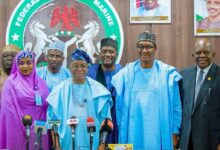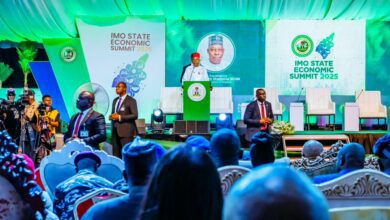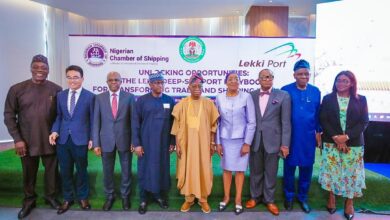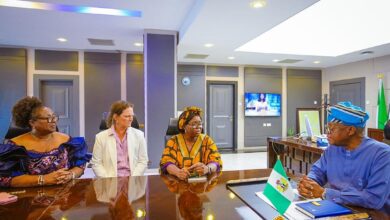Current Economic Challenges Present Opportunities For Nation’s Growth, Dev’t -Tinubu
By Sunday Etuka, Abuja
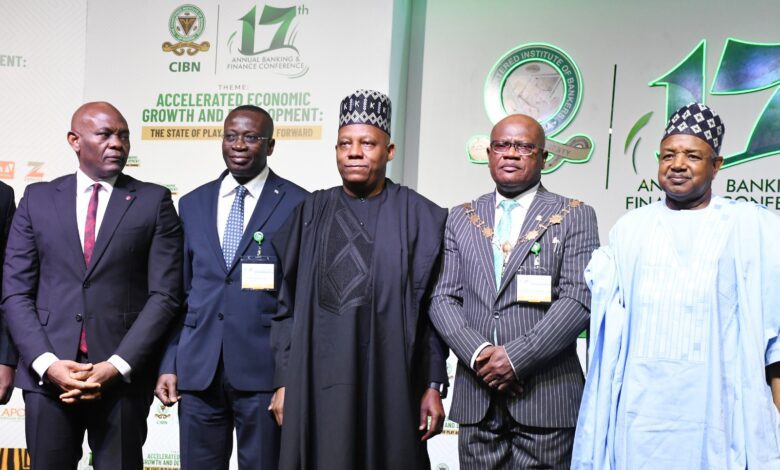
President Bola Tinubu has stated that the current economic challenges in the country, such as the high inflation rate, rising costs of living, unemployment, infrastructure deficits and effects of global economic shifts, present opportunities for growth and development.
The President spoke on Tuesday when he declared open the 17th Annual Chartered Institute of Bankers of Nigeria Banking and Finance Conference held in Abuja.
Represented by Vice President Kashim Shettima, Tinubu described this year’s theme for the CIBN Conference, ‘Accelerating Economic Growth and Development: The State of Play and the Way Forward,’ as both timely and imperative, noting that it came at a time the nation is grappling with interrelated challenges.
“This theme will enable us to evaluate where we stand as a nation, understand the root causes of our economic challenges, and explore actionable strategies to accelerate growth and development sustainably and inclusively,” he noted.
According to him, his administration has taken courageous steps to reform Nigeria’s macroeconomic environment, with a focus on restoring confidence in the nation’s economy.
This, he said, the federal government is rigorously working to actualise through measures targeted at reducing inflation, stabilising the foreign exchange market and improving fiscal management.
A statement by the Special Assistant to the Vice President on Media and Publicity, Stanley Nkwocha said, while explaining efforts being made to restore confidence in the nation’s economy, President Tinubu said, “We have taken bold steps to reform the macroeconomic environment. Our focus is on restoring confidence in the Nigerian economy through measures aimed at reducing inflation, stabilising the foreign exchange market, and improving fiscal management.
“Though painful in the short term, the removal of fuel subsidies is designed to free up budgetary resources for critical investments in infrastructure and social services, frequent adjustment of the monetary policy rate, a move aimed at curbing inflation and fostering a more market-oriented exchange rate system”.
President Tinubu also noted that his administration is committed to strengthening infrastructure development in the ongoing bid to grow Nigeria’s economy.
“We are committed to upgrading Nigeria’s infrastructure to support economic growth. We are investing in roads, railways, and energy projects through public-private partnerships to reduce transportation costs and improve market access,” he said.
He further explained why the administration is prioritising the digital economy, which he said will drive innovation and enhance financial inclusion.
He continued: “We are expanding broadband penetration and encouraging the growth of tech startups through initiatives such as the Digital Nigeria program. For example, we currently train three million Nigerian youths in digital technology and essential skills and then deploy them to innovation hubs.
“These efforts are designed to create jobs, increase productivity, and make financial services more accessible to Nigerians in all corners of the country. It is essential to state that we are committed to achieving a 70% digital literacy level by 2027 through innovative approaches in delivering initiatives, continuous collaborations and stakeholder engagement.”
On the way forward, the President called for collaboration across all sectors, including the government, private industry, and civil society organisations, saying, “To achieve sustained economic growth, we must intentionally align our policies and actions with the changing global landscape.
“The government is committed to implementing reforms to enhance macroeconomic stability, reduce inflation, and support infrastructure development”.
President Tinubu expressed hope that the conference will provide a platform for the sharing of ideas, exchange of knowledge, and exploration of innovative solutions to the challenges bedevilling the country.
“The conversations during this event will allow us to dissect the critical problems affecting our financial system and economy, identify growth opportunities, and collectively shape the future of banking and finance in Nigeria,” he added.
Earlier, President/Chairman of CIBN, Prof. Pius Deji Olanrewaju, called for urgent introspection on Nigeria’s economic challenges, stressing the need for innovative solutions.
“We are on a journey to economic growth and prosperity,” Olanrewaju stated, acknowledging however that “the current challenges are things of concern.”
He emphasised that while the Central Bank of Nigeria has introduced several monetary policies to address these issues, their success hinges on “the professionalism and patriotism of operators in the financial services sector.”
In his goodwill message, Chairman of the Economic and Financial Crimes Commission (EFCC), Ola Olukoyede, said his Agency will help to sanitize the financial system and instill laws that fight financial crimes.
While noting that economic policies will progress where profit is not prioritized by stakeholders but the interest of the nation, the EFCC boss admonished bankers to have renewed commitment to services that will promote economic development and nation-building.
In his keynote address, Chairman of UBA Group and Heirs Holdings, Tony Elumelu, said Nigeria’s power sector is a critical factor for industrial and economic advancement. “Unlocking our power sector potential is crucial for our economic growth. We must invest in infrastructure, encourage private sector participation, and implement policies to ensure stable and affordable electricity for all Nigerians,” he said.
Elumelu also pointed to national security as a major hurdle to economic stability, saying, “We must address this issue head-on to create an environment conducive for investment and economic activities”.
He further emphasized the importance of food security, urging investments in agricultural technology and support for farmers, adding that “a well-fed nation is a productive nation”.
On youth empowerment, Elumelu described entrepreneurship as a powerful tool for tackling unemployment.
“We must create an enabling environment to retain our young entrepreneurs and empower them to turn their ideas into successful businesses within the country,” he stressed, noting that the future of the Nigerian economy depends on its youth.
He praised the progress made in Nigeria’s banking sector, calling for continued collaboration to strengthen its role in supporting the nation’s economy.


